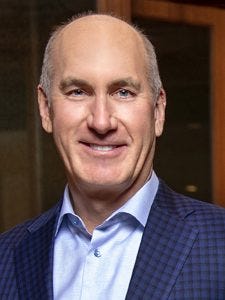$43 Billion AT&T Media Sale Puts Focus Back on Broadband$43 Billion AT&T Media Sale Puts Focus Back on Broadband
The carrier is parting ways with media properties it acquired during Randall Stephenson's tenure.

AT&T is returning its focus to its legacy business by selling its media unit.
The telco is selling its WarnerMedia division to Discovery in a $43 billion all-stock transaction. Discovery will use the deal to merge formerly AT&T-owned entertainment brands like HBOMax, CNN and TNT into its portfolio alongside brands like HGTV and The Food Network.
But more importantly, the deal represents a “sharpened” AT&T focus on broadband connectivity. The company said it is focusing on connectivity. That includes both mobile and fixed broadband.
“For AT&T shareholders, this is an opportunity to unlock value and be one of the best capitalized broadband companies, focused on investing in 5G and fiber to meet substantial, long-term demand for connectivity,” AT&T CEO John Stankey said.

AT&T’s John Stankey
AT&T also cited its ability to shed debt through the divestment. Light Reading notes that AT&T was carrying $155.2 billion in debt at the end of last year.
Discovery president and CEO David Zaslav will lead the combined company, but we will wait to see how many WarnerMedia executives remain on board.
“We will build a new chapter together with the creative and talented WarnerMedia team and these incredible assets built on a nearly 100-year legacy of the most wonderful storytelling in the world,” Zaslav said. “That will be our singular mission: to focus on telling the most amazing stories and have a ton of fun doing it.”
The announcement comes five years after AT&T first announced plans to buy Time Warner and become a provider of its own content. However, the New York Times is calling AT&T’s foray into media a “failed acquisition strategy.”
Exiting Media
Fierce AT&T rival Verizon also recently exited the media business. Verizon offloaded its media unit (formerly known as Oath) to private equity firm Apollo Global Management. The sale yields a considerably lower price tag at $5 billion.
Vertical mergers between telecommunications service providers – or mobile network operators to be more specific – and media companies seemed far more popular in 2016, when AT&T agreed upon an $85 billion acquisition of Time Warner. The deal dragged on through regulatory approval after regulatory approval until 2019. Nevertheless, many of us pointed to the acquisition as a sign of the times. Gil Regev, chief communications officer of RGK Mobile, in 2017 predicted mobile operators would assume control over content providers.
“As audiences are moving swiftly to consume data via mobile devices, streaming services are gaining momentum over cable TV. As a result, it’s inevitable that we will see mobile operators move to take over content providers in both the U.S. and EU, trying not only to collaborate with them but bring these in-house and by thus controlling access, advertising space and quality of content,” Regev said.
But the telcos now seem to view media in a different light.
“It turns out there aren’t very many synergies between content and distribution after all,” Light Reading’s Pádraig Belton wrote.
Partner Impact
The divesture could give channel partners a bigger seat at the table, as AT&T focuses on broadband. AT&T’s business wireline revenues were $6 billion in the first quarter of 2021. They dropped 3.5% from the same quarter a year ago, but expenses have dropped at a similar rate. Moreover, AT&T’s mobility business unit gained 3.6 million wireless subscribers in the first quarter.
Want to contact the author directly about this story? Have ideas for a follow-up article? Email James Anderson or connect with him on LinkedIn. |
Read more about:
AgentsAbout the Author
You May Also Like


